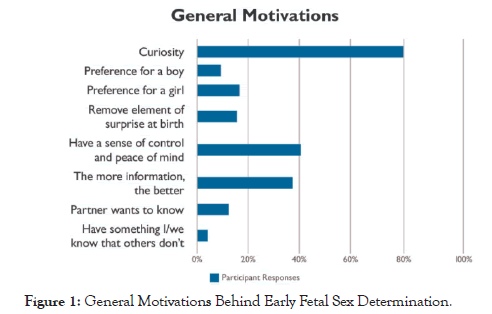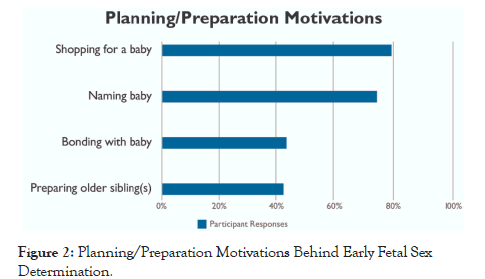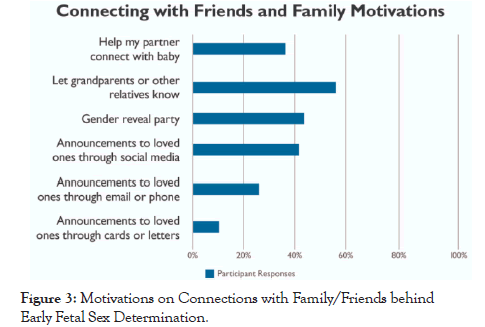Indexed In
- Genamics JournalSeek
- RefSeek
- Hamdard University
- EBSCO A-Z
- Publons
- Geneva Foundation for Medical Education and Research
- Euro Pub
- Google Scholar
Useful Links
Share This Page
Journal Flyer

Open Access Journals
- Agri and Aquaculture
- Biochemistry
- Bioinformatics & Systems Biology
- Business & Management
- Chemistry
- Clinical Sciences
- Engineering
- Food & Nutrition
- General Science
- Genetics & Molecular Biology
- Immunology & Microbiology
- Medical Sciences
- Neuroscience & Psychology
- Nursing & Health Care
- Pharmaceutical Sciences
Research Article - (2020) Volume 17, Issue 6
Motivations behind Early Fetal Sex Determination
Nina Hoang, Haley Milot* and Chris JacobReceived: 25-Sep-2020 Published: 14-Oct-2020, DOI: 10.35248/2090-7214.20.17.362
Abstract
There are many momentous events that accompany the journey of childbirth, one of which is the discovery of the fetus’s sex. Many expecting families are unaware that in addition to traditional approaches, newer technologies enable an earlier determination of the fetus’s sex. This may be because little research has been conducted on reasons why expecting mothers opt for an earlier identification technique. A company focused on DNA-based prenatal and pediatric tests, Gateway Genomics, aimed to specify the motivations behind early fetal sex determination by acquiring input from expecting mothers who purchased the SneakPeek® Early Gender Test, which can be utilized as early as 8 weeks into pregnancy. Following data collection and analysis, it was revealed that there were various motives that influenced the selection of an earlier fetal sex determination method. The most significant factors were curiosity and the ability to shop for and name the fetus.
Keywords
NIPT; Pregnancy; Early fetal sex determination; SneakPeek; 8 weeks; Gender test
Introduction
Fetal sex determination is a pivotal moment in expecting parents’ lives. One method utilized to identify the fetus’s sex is through an ultrasound at 12 to 14 weeks’ gestation, but more commonly at 18 to 20 weeks [1]. Other options, such as chorionic villus sampling from 10 to 12 weeks, and amniocentesis from 18 weeks, are also available [2]. However, both techniques are invasive and pose the risk of pregnancy loss [3]. More recently, Non-Invasive Prenatal Testing (NIPT) or cell-free DNA testing (cfDNA), provides a noninvasive method for early identification of fetal sex [4] NIPT is based on the analysis and detection of Y chromosome DNA sequences in cell-free fetal DNA present in maternal blood [5].
As advances in technology have allowed earlier fetal sex determination to be offered to prospective parents, the desire to learn about the fetus’s sex prior to childbirth has increased. Several studies have shown that over 50% of women and their partners wish to know the sex of their child before birth [6, 7]. Expecting parents’ motivation for learning their fetus’s sex originates from not only medical concerns but also nonmedical and social reasons. These reasons include childbearing preparations, the desire for a closer emotional attachment to the fetus, and bestowing a sense of personhood and social identity upon the fetus instead of using gender-neutral pronouns such as “it.”[8]. Furthermore, fetal sex determination has been shown to confer benefits to both the parents and to the unborn child as prenatal knowledge of the fetus’s sex is correlated to prenatal care-seeking behavior [9].
To explore intentions behind early fetal sex determination, we conducted a survey of parents that used the SneakPeek® Early Gender Test to learn fetal sex. The SneakPeek® Early Gender Test is a prenatal blood test that has been shown to determine fetal sex as early as 8 weeks’ gestation with a 99.1% accuracy [10]. In this study, we sought to determine the factors associated with expecting parents’ desire to learn the fetus’s sex early in pregnancy.
Methods
An online survey was conducted from August 8th, 2019 to August 22nd, 2019. Out of the 3,467 women who received the survey through email, 1,113 completed the survey. Eligible participants consisted of expecting mothers who had purchased the SneakPeek® Early Gender Test and activated the test kit. The survey was comprised of four questions; the first three were presented in a “Select all that apply” format while the last question appeared as a free response (Table 1).
| Choices (Check all the apply) | |
|---|---|
| Question 1: General Reasons |
|
| Question 2: Planning/Preparation Reasons |
|
| Question 3: Connecting with Friends and Family Reasons |
|
Question 4: Please provide additional reasons or describe any of the above further.
Table 1: Survey questionnaire.
A response for each question was not required, and questions could be left unanswered if the participant did not wish to provide an answer. The topics surveyed included general motivations, planning and preparation purposes, and connection with friends and families as the potential reasons for seeking to learn fetal sex. Answer choices associated with the respective topics were provided for respondents to select from. The final portion of the survey was open-ended to allow respondents to either indicate additional motives that have not been presented or elaborate on previously selected responses. Analysis was done after data collection was completed.
Results
General motivations
The survey began with potential general motivations that compelled expecting mothers to seek knowledge of their fetus’s sex (Figure 1).

Figure 1: General Motivations Behind Early Fetal Sex Determination.
All 1,113 participants provided their input to this question by selecting all that applied from the eight choices that were provided. A majority (77.5%) of the respondents reported that curiosity was one of the motives for identifying the fetus’s sex. In the final portion of the survey, expecting mothers emphasized their impatient emotions prior to knowing the fetus’s sex while others indicated feelings of excitement. Other answer choices that were frequently selected were the thought of having a sense of control and peace of mind (38.5%) and that the more information, the more beneficial (36.3%). Factors regarding the element of surprise (14.9%), and preference for either a girl (16.4%) or a boy (9.0%) all received the fewest responses among study participants. The free response data revealed that a predilection for a particular sex primarily stems from families who have had multiple children of the same sex, and therefore, would wish to identify the fetus’s sex to begin preparations. Furthermore, learning the fetus’s sex would allow parents to mentally accept or process the news in the case that the sex is different from their preferred sex. The idea of having information that others are unaware of received the lowest response (4.0%)
Planning and/or preparation motivations
The next portion of the survey detailed potential planning and preparation factors that may have influenced expecting mother’s decision to learn the fetus’s sex at the earliest opportunity (Figure 2).

Figure 2: Planning/Preparation Motivations Behind Early Fetal Sex Determination.
Out of the total sample population, 1,111 participants provided feedback. At 78.6%, the greatest number of mothers considered it valuable to learn their fetus’s sex in order to properly shop for the baby. This was a notable concern for mothers with older children who are all the same sex. Some mothers also expressed the desire to design and decorate the baby’s nursery upon learning the fetus’s sex. A wide majority of expecting mothers also indicated naming the baby (74.4%) was a strong motivator for learning fetal sex early. Additionally, 43.2% of the respondents wanted to learn the fetus’s sex in order to bond with the baby and 42.4% wanted to learn fetal sex to prepare older sibling(s) before the baby’s arrival. Expecting mothers in this study also stated that they hoped to feel more connected to “to such a big part of their identity” and that the news would help the pregnancy “feel more real.”
Motivations on connecting with friends and family
The third question of the survey aimed to examine potential factors regarding connections to friends and family that may have impacted the desire to learn fetal sex earlier in the course of pregnancy. A total of 1,088 expecting mothers responded to the question. The most influential factor was revealed to be the ability to inform grandparents and other relatives of the fetus’s sex (54.2%). Another 42.0% of the respondents were eager to learn the fetus’s sex to prepare a gender reveal party for their friends and family. At 40.4%, the third most selected reason for expecting mothers to learn the fetus’s sex was to announce the news to loved ones through social media, while others intended to disclose the information through email or phone (24.5%), or through cards or letters (10.3%). Lastly, 35.2% of the expecting mothers believed that learning the fetus’s sex will support their partner’s connection to the baby (Figure 3).

Figure 3: Motivations on Connections with Family/Friends behind Early Fetal Sex Determination.
Free response
The final section of the survey allowed participants to provide their own motivations behind early fetal sex determination. A majority of responses in this section indicated that mothers did not wish to wait for an ultrasound to determine the fetus’s sex. Some respondents noted that they wanted to quickly receive knowledge of the fetus’s sex to confirm their suspicions of a particular sex. Although there were several expecting mothers who revealed that their reason for taking the prenatal gender test was “trying something new” or “just for fun,” there was also a large number who had successfully used the test before and received a positive experience. The final factor that was provided in this section of the survey was multiple reports regarding prior miscarriages and the regret of not knowing the fetus’s sex beforehand.
Discussion
Gateway Genomics conducted this survey study to learn the most common reasons pregnant women want to learn fetal sex early in pregnancy. The survey was designed to focus on the topics of general motivations, planning and preparation considerations, and perceived connections with family and friends. The questionnaire was completed by a total of 1, 113 expecting mothers who purchased the SneakPeek® Early Gender DNA Test but had not yet received their test result. Analysis of the study’s findings was used to assess motivations behind utilization of early fetal sex determination techniques.
The most common reported reason for learning the fetus’s sex early was to satisfy one’s curiosity. In contrast to other fetal sex identification techniques, to the SneakPeek® Early Gender DNA Test can accurately provide the fetus’s sex as early as 8 weeks’ gestation — weeks earlier than any other method available to families. Other reasons that were provided by study participants were the desire to have a sense of control and peace of mind as well as the belief that additional information would be beneficial. The knowledge of the fetus’s sex does carry the potential to relieve expecting parents’ emotions of impatience and anxiety as the childbearing process can be a restless journey. Moreover, by gaining insight into the fetus’s sex earlier in the pregnancy journey, expecting parents will have more time for baby preparations. Preferences for a specific sex were not a significant reason for learning fetal sex from study participants.
Planning and preparations for the arrival of a new baby can be strenuous and time consuming. Thus, expecting mothers shared a desire to learn the fetus’s sex as early as possible to be adequately prepared for his or her arrival. Expecting families would not be able to begin preparations before learning of the fetus’s sex because living spaces and even clothes can be fundamentally different when it comes to a baby’s sex. Additionally, learning the fetus’s sex in the first trimester of pregnancy would allow expecting mothers to bond with their fetus throughout fetal development. For families with older children, it may be vital to expose and mentally prepare the older siblings of the fetus’s sex in order to ease unfamiliar feelings and develop a stronger attachment.
Aside from the perceived benefits to the immediate family as motives for determining the fetus’s sex early in pregnancy, expecting mothers have provided reasons that confer benefits to family and friends. The desire to hold a gender reveal party or announce the news through various platforms has become increasingly popular. The announcement of the fetus’s sex then becomes a momentous event that strengthens relationships in celebration of the wonderful surprise.
Although fetal sex determination at 8 weeks is a relatively new, it could also be viewed as a “fun” engagement that provides information to a significant factor of pregnancy — the fetus’s sex. Those who have successfully utilized the method have not only confirmed its accuracy but also expressed regret on not utilizing it for prior pregnancies. In particular, mothers who did not meet the gestational threshold for an ultrasound or other fetal sex identification techniques when they experienced a miscarriage feel remorse for not learning of the fetus’s sex beforehand. The ability to learn the fetus’s sex allows expecting parents to potentially name the baby so that he or she will remain a part of the family even in the event of fetal loss.
A few potential limitations of this study should be noted. The short length of the questionnaire and limited answer selections may not be adequate in identifying all the reasons behind expecting parent’s decision to learn the fetus’s sex at an earlier time. Additionally, by providing prepared answers, respondents may not have engaged in critical thinking when composing additional motives for taking the SneakPeek® Early Gender DNA Test. Moreover, the positive answer selections may have influenced participants’ self-composed responses.
Conclusion
Users of SneakPeek® Early Gender DNA Test have reported diverse motives for learning the fetus’s sex at the earliest opportunity. The perceived reasons behind the desire for early fetal sex determination presume benefits of which cannot be provided by traditional methods for fetal sex determination such as ultrasound offered at later stages in pregnancy.
REFERENCES
- Odeh M, Granin V, Kais M, Ophir E, Bornstein J. Sonographic fetal sex determination. Obstet Gynecol Surv. 2009;64(1):50‐57.
- Alfirevic Z, Gosden CM, Neilson JP. Chorion villus sampling versus amniocentesis for prenatal diagnosis. Cochrane Database Syst Rev. 2000;(2):CD000055.
- Alfirevic Z, Navaratnam K, Mujezinovic F. Amniocentesis and chorionic villus sampling for prenatal diagnosis. Cochrane Database Syst Rev. 2017;9(9):CD003252.
- Lewis C, Hill M, Skirton H, Chitty LS. Non-invasive prenatal diagnosis for fetal sex determination: benefits and disadvantages from the service users' perspective. Eur J Hum Genet. 2012;20(11):1127‐1133.
- Ormstad SS, Stoinska‐Schneider A, Solberg B, Fure B, Juvet LK. Non‐Invasive Prenatal Testing (NIPT) for Fetal Sex Determination. Health Technology Assessment. Oslo, Norway: Knowledge Centre for the Health Services at The Norwegian Institute of Public Health (NIPH); 2016.
- Shipp TD, Shipp DZ, Bromley B, Sheahan R, Cohen A, Lieberman E, et al. What Factors Are Associated with Parents’ Desire to Know the Sex of Their Unborn Child? Birth: Issues in Perinatal Care. 2004;31(4):272-279.
- Larsson M, Berglund M, Jarl E, Tydén T. Do pregnant women want to know the sex of the expected child at routine ultrasound and are they interested in sex selection?. Ups J Med Sci. 2017;122(4):254‐259.
- Bowman‐Smart H, Savulescu J, Gyngell C, Mand C, Delatycki MB. Sex selection and non‐invasive prenatal testing: A review of current practices, evidence, and ethical issues. Prenatal Diagnosis. 2020;40(4):398-407.
- Al-Akour NA. Knowing the Fetal Gender and its Relationship to Seeking Prenatal Care: Results from Jordan. Maternal and Child Health Journal. 2007;12(6):787-792.
- Casanova J, Cacia S, Milot H, Jacob C. Accurate fetal sex determination from maternal blood at 8 weeks gestation. Int J Pregn & Chi Birth. 2019;5(4):135-137.
Citation: Hoang N, Milot H, Jacob C (2020) Motivations behind Early Fetal Sex Determination. Clinics Mother Child Health. 17: 362.
Copyright: © 2020 Hoang N, et al. This is an open-access article distributed under the terms of the Creative Commons Attribution License, which permits unrestricted use, distribution, and reproduction in any medium, provided the original author and source are credited.

